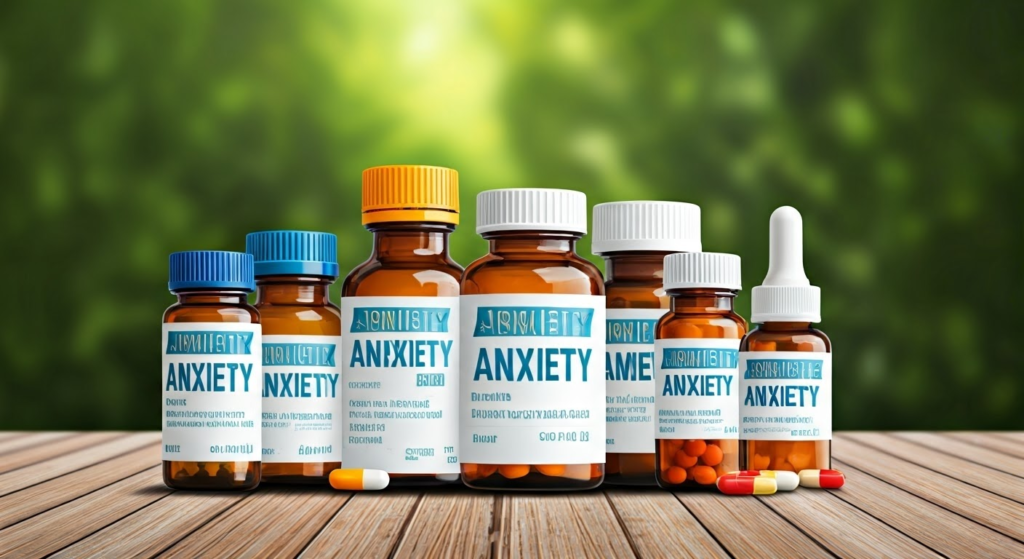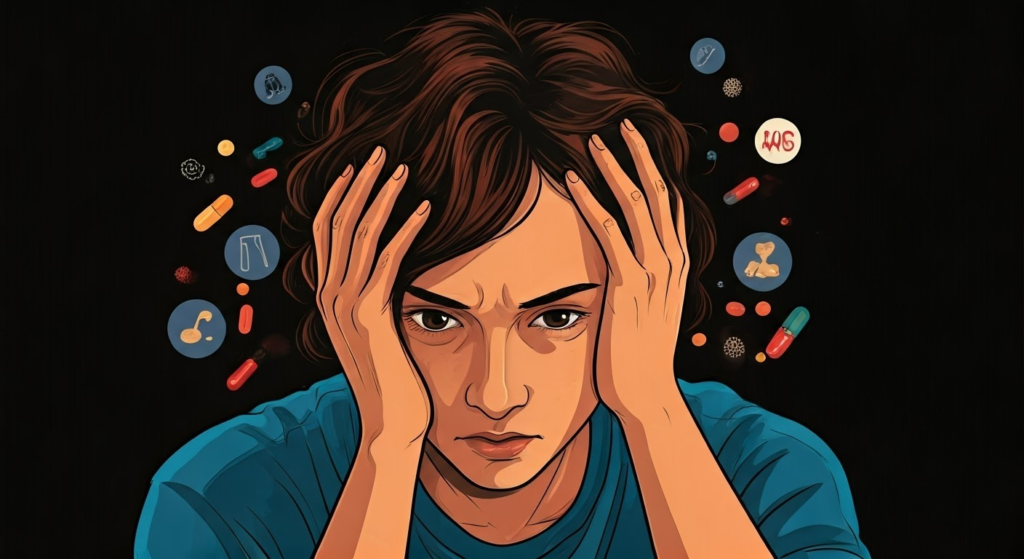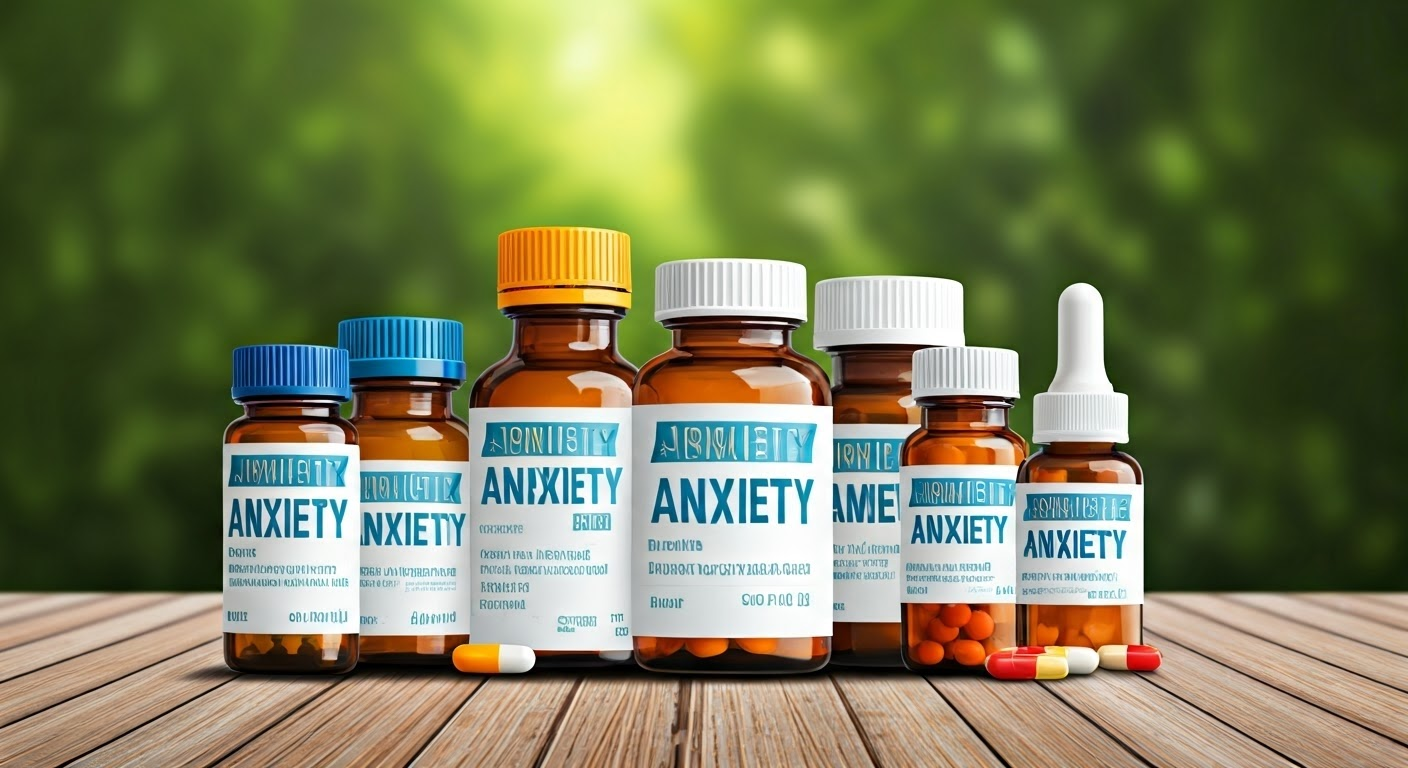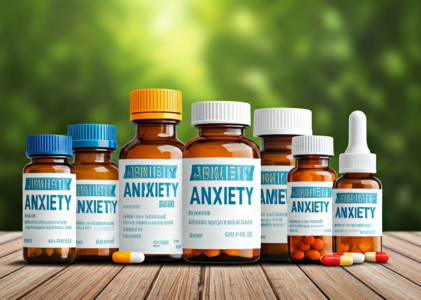Discover Effective Drugs for Anxiety Relief

Key Highlights
- Medication can effectively manage anxiety and reduce symptoms, but it’s crucial to consult a mental health professional for proper diagnosis and treatment.
- SSRIs and SNRIs are common first-line anxiety medications that increase serotonin and norepinephrine levels in the brain, promoting mood regulation.
- Benzodiazepines, such as Xanax, offer rapid anxiety relief, but long-term use carries the risk of dependence and withdrawal symptoms.
- It’s vital to discuss your medical history and potential side effects with your doctor to determine the most suitable medication.
- Lifestyle modifications, including regular exercise, a balanced diet, and stress-reduction techniques, play a crucial role in anxiety management.
Introduction
Mental health includes many different conditions, with anxiety disorders being quite common. When anxiety affects daily life a lot, finding effective treatment for anxiety is very important. One way to manage anxiety symptoms is through medication. It can be a helpful tool for improving overall well-being.
Understanding Anxiety and Medication
In a busy world with many stressors, feeling anxious sometimes is normal. But if anxiety sticks around and affects your daily life, it could mean you have an anxiety disorder.
The good news is there are different treatments you can try. Medication can be very helpful for managing anxiety symptoms. It is important to know that medication is not the same for everyone. You should think about taking it with the help of a qualified mental health professional.
The Importance of Recognizing Anxiety Symptoms
Understanding the symptoms of anxiety is very important for getting help on time. Anxiety shows up in both your mind and body. Emotionally, you may feel a lot of worry, restlessness, or even a fear of something bad happening.
Physical symptoms of anxiety can include a fast heartbeat, sweating, shaking, trouble breathing, and stomach problems. It’s key to know that anxiety can look different for different people.
There are several types of anxiety, each with its own features. Some common types of anxiety are generalized anxiety disorder (GAD), panic disorder, social anxiety disorder, and phobias. Knowing the specific type of anxiety you have can help create a better treatment plan.
How Medications Can Help in Anxiety Relief
Anxiety medications work by targeting certain chemicals in the brain. These chemicals affect mood, feelings, and actions. The goal of these medications is to balance these chemicals and reduce anxiety symptoms.
An effective treatment of anxiety usually requires a mix of methods. This includes medication along with therapy and lifestyle changes. While anxiety medication helps with the symptoms, therapy focuses on the deeper issues and gives you ways to cope.
Also, finding the right anxiety medication is a personal journey. It’s important to consider things like the type and level of anxiety, your medical history, and how you respond to different medications. All these factors help to find the best medication and the right dose for you.
Types of Medications Used for Anxiety Relief

The world of anxiety medications has many choices. Each one helps with different parts of anxiety. Usually, doctors choose these medications based on what the person needs and the type of anxiety disorder they have.
This tailored approach helps the medication fit well with the person’s goals and reduces the chance of side effects. Good communication between the patient and the doctor is very important during this time.
SSRIs and SNRIs: First-Line Treatments for Anxiety
Selective serotonin reuptake inhibitors, or SSRIs, are a type of antidepressant. They are often the first choice for treating anxiety disorders. SSRIs help by boosting serotonin levels in the brain. Serotonin is important for controlling mood, sleep, and feelings.
The Depression Association of America says that SSRIs can effectively treat different anxiety disorders. These include generalized anxiety disorder, panic disorder, social anxiety disorder, and obsessive-compulsive disorder.
There are also serotonin-norepinephrine reuptake inhibitors, or SNRIs. These work by increasing both serotonin and norepinephrine in the brain. This helps people who have both anxiety and depression.
Some common SSRIs and SNRIs include escitalopram (Lexapro), fluoxetine (Prozac), sertraline (Zoloft), duloxetine (Cymbalta), and venlafaxine (Effexor XR).
Benzodiazepines: Quick Relief for High Anxiety Moments
Benzodiazepines are a group of medicines known for their quick calming effects, often referred to by their brand names. They are often used for sudden anxiety episodes, such as panic attacks. These drugs work on the central nervous system by boosting the effects of GABA. GABA is a chemical that helps the body relax and lowers nerve activity.
Although benzodiazepines can help in the short term, they can also lead to higher risk of dependence if used for too long. This can cause people to need higher doses over time and may result in withdrawal symptoms when stopping the drug. That is why it’s important to use them carefully and only under a doctor’s care.
Some common benzodiazepines for anxiety are alprazolam (Xanax), clonazepam (Klonopin), diazepam (Valium), and lorazepam (Ativan). Doctors carefully consider the benefits and risks before giving these medications, usually suggesting short-term use when possible.
Other Medications: Exploring Alternatives
Beyond SSRIs, SNRIs, and benzodiazepines, there are other medications that work well for anxiety. Tricyclic antidepressants (TCAs) are older types of antidepressants. They are sometimes used when the first-line options do not work well or cause bad side effects.
TCAs change neurotransmitter levels in the brain, but they usually work in a different way than SSRIs and SNRIs. Beta blockers, which are mainly used for heart conditions like high blood pressure, can also help with physical anxiety symptoms.
They do this by blocking the impact of adrenaline. This hormone is released when the body is stressed. Atypical antidepressants, like bupropion (Wellbutrin) and mirtazapine (Remeron), have their own special ways of working. They may help with anxiety for some people.
Navigating Through the Options: Finding the Right Medication
Finding the right anxiety medication often means working together with a healthcare professional. This usually includes a complete check-up that looks at the person’s medical history, their anxiety symptoms, and any issues with other medications.
Some things that affect the choice of medication are other health conditions, past responses to treatments, and what the individual prefers. It is very important to openly talk about any worries and possible side effects with the healthcare professional. This helps both parties make better choices.
Consulting Healthcare Professionals for Anxiety Management
If anxiety is affecting your everyday life, getting help from a mental health professional is important. These experts can diagnose your issues and suggest the right treatments, like medication if needed.
A mental health professional will carefully check your symptoms, medical history, and any other factors that might play a role in your anxiety. It’s key to know that anxiety affects everyone differently, so a personal treatment plan is important.
Getting professional help means you will receive care that fits your specific needs. This can improve your chances of managing anxiety well. Remember, asking for help shows strength and is a vital step in taking back control of your mental health.
Personalizing Your Treatment Plan: What to Consider
Developing a personal treatment plan for anxiety requires looking at different factors to make it work better. The first step is to find out what type and how severe the anxiety symptoms are.
It helps to know if the anxiety is general, comes from specific situations like social anxiety disorder, or happens as sudden panic attacks. This information helps decide on the best treatment. A mental health professional may suggest medications based on this assessment.
Other factors to think about include medical history, possible drug interactions, and individual choices about different types of medication. It’s also important to regularly check how the treatment is going. Open communication between the individual and their healthcare provider is key to make adjustments and ensure the plan fits their changing needs.
Potential Side Effects and How to Manage Them

Anxiety medications can help a lot, but it’s important to remember they might have side effects. These side effects can change depending on the type of medication, how much you take, and how your body reacts to it.
You should talk openly with your doctor and let them know right away if you feel any negative effects. Luckily, there are many ways to handle side effects that can make the treatment easier to stick with and improve the results.
Common Side Effects of Anxiety Medications
Understanding the possible side effects of anxiety medications is very important. This helps you make smart choices about your treatment. Remember, not everyone will have these side effects. Their strength can be very different for each person.
Common side effects are nausea, dizziness, drowsiness, dry mouth, and changes in appetite. Weight gain can be a side effect too, especially with some medications when used for a long time. This shows why keeping a healthy diet and staying active is vital. Sometimes, anxiety medications can cause sexual side effects like a lower sex drive or trouble reaching orgasm. It’s important to talk to your doctor about these issues.
This information is not medical advice. Always check with a healthcare professional for advice just for you. They can give you detailed information based on your health history, ensuring you take your medications safely and effectively.
Strategies for Managing Side Effects
Managing side effects well is very important for taking your medication correctly and getting the best results. Changing your lifestyle can help reduce some of these issues. Eating a balanced diet, exercising regularly, and getting enough quality sleep can help you feel better and lessen some side effects.
Sometimes, changing the dose or the time you take your medication can be helpful. It’s important to do this with advice from a healthcare professional. Also, slowly reducing the medication when it’s the right time can help avoid withdrawal effects.
It’s key to talk openly about any worries or experiences with your doctor. They can give you specific advice, look into other medication options if needed, and support you through this process. This communication can help you feel more at ease and confident as you work towards feeling better.
The Role of Lifestyle Changes and Natural Remedies
Hank Drugs
Beyond medication, changing your lifestyle and using natural remedies can help manage anxiety. Adding these practices to your daily life, together with regular treatments, can lower anxiety levels and improve your well-being.
Keep in mind that while natural remedies can be helpful, you should talk to your doctor before using them. This is important, especially if you have health issues or are taking medications.
Diet, Exercise, and Anxiety: What’s the Connection?
The connection between diet, exercise, and anxiety is becoming more understood. Changes in these areas can greatly affect mental health. Eating a balanced diet with fruits, vegetables, whole grains, and lean protein gives the body important nutrients. These nutrients help the brain work well and improve mood.
However, eating too much processed food, sugary drinks, and caffeine can make anxiety levels worse. Regular exercise, even light activities like brisk walking or yoga, can lessen anxiety symptoms. When we exercise, our bodies produce endorphins. These are natural mood-boosters that help reduce stress.
Being mindful while eating, such as noticing hunger signals and enjoying each bite, can create a better relationship with food. This way, we can reduce emotional eating, which is often linked to anxiety. By taking a full approach that includes changes in diet and exercise, people can improve their mental well-being and better manage their anxiety levels.
Natural Supplements and Herbs for Anxiety Relief
In the quest for anxiety relief, many people look to natural supplements and herbs for help. These can have benefits, but it’s important to use them carefully and talk to a healthcare professional first.
Some natural supplements, like omega-3 fatty acids, can help with anxiety symptoms. You can find omega-3 fatty acids in fatty fish such as salmon. Chamomile is another popular choice known for its calming effects. Other herbs like passionflower, valerian root, and lavender are also known to help reduce anxiety.
It’s important to remember that while these natural remedies might provide some relief, they should not replace regular treatments for a lot of people. This is especially true for severe anxiety or anxiety disorders. Think of them as additional options to improve mental well-being, and always use them under the care of a qualified healthcare expert.
The Journey Beyond Medication: Therapy and Support Systems
Medication can help with anxiety, but it’s important to know that it’s not the only answer. To tackle the real issues behind anxiety and to build coping skills, therapy and support systems must be part of the treatment plan.
These approaches offer useful tools and ways to handle the difficulties of anxiety. They help people recover over time and improve their everyday life. They also enable individuals to face challenges, build strength, and increase self-awareness.
Cognitive-Behavioral Therapy (CBT) and Its Effectiveness
Cognitive-behavioral therapy (CBT), which is a type of cognitive behavioral therapy, is a well-known treatment for anxiety disorders. It aims to find and change negative thoughts and behaviors related to anxiety. Research has shown that CBT is very effective in managing symptoms of anxiety and lowering the chances of relapse. By mixing cognitive changes with behavioral techniques, CBT gives people practical tools to handle anxiety triggers and boost their overall mental health. This therapy is often suggested as the first choice for different types of anxiety disorders.
Support Groups and Peer Support in Anxiety Management
The path to managing anxiety feels easier when you have others with you who understand. Support groups and peer support create important places for people with anxiety to come together, share their stories, and feel comfort from knowing they are not alone.
Support groups let people share their feelings, exchange tips for coping, and learn from those who have faced similar issues. Peer support provides a more casual way for people to meet others dealing with anxiety.
Both types of support build a sense of community. They help lessen feelings of being alone and give encouragement to keep going on the journey of managing anxiety. These support systems work well with traditional therapy and help people face their anxiety journey with stronger hope and resilience.
Conclusion
Anxiety relief is possible with different medications and therapies that fit individual needs. First, understanding your symptoms is important. Then, talking to healthcare professionals can help. It is also key to personalize your treatment for better results. You can benefit from lifestyle changes and natural remedies alongside your medication. As you look at different options, make sure to know about possible side effects and how to deal with them. Remember, finding relief from anxiety is a journey. It often requires a mix of medications, therapy, and support that fits your specific situation. Always seek professional help to find the best way to support your mental well-being.
Frequently Asked Questions
What is the safest drug for anxiety?
There isn’t one “safest drug” for anxiety that works for everyone. To find the best anxiety medication, you need to think about your own needs and medical history. It’s also important to look at the risk of dependence tied to some medicines. So, talking to a doctor is very important.
How long does it take for anxiety medication to work?
The length of time anxiety medication works can change. It depends on what type of medication you take and other personal factors. Some medications act quickly and give relief right away. On the other hand, medications such as antidepressants may take weeks to show clear改善 in treating anxiety.
Can anxiety medication be used long-term?
The long-term use of anxiety medication depends on the type of medication and your individual needs. There are some medications that are for short-term use. Other medications may be safe for longer use, but only with careful medical supervision. It is important to consult a doctor.
https://www.ncbi.nlm.nih.gov/books/NBK539848
https://www.ncbi.nlm.nih.gov/pmc/articles/PMC5099559
https://order.store.mayoclinic.com/flex/mmv/fhblc01
https://doi.org/10.1176/appi.books.9780890425787.x05_Anxiety_Disorders
https://adaa.org/find-help/support
https://adaa.org/find-help/treatment-help/medication-options

